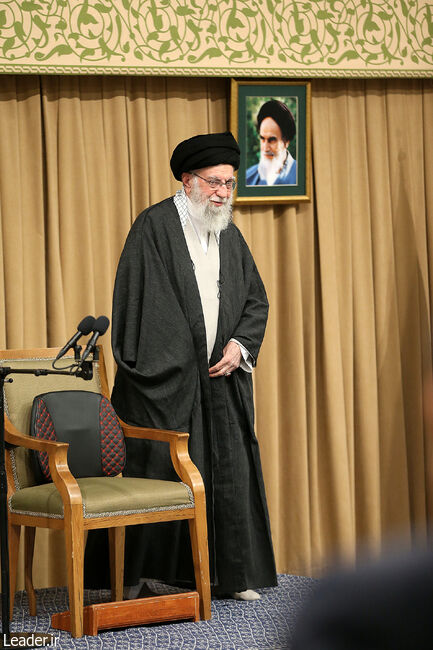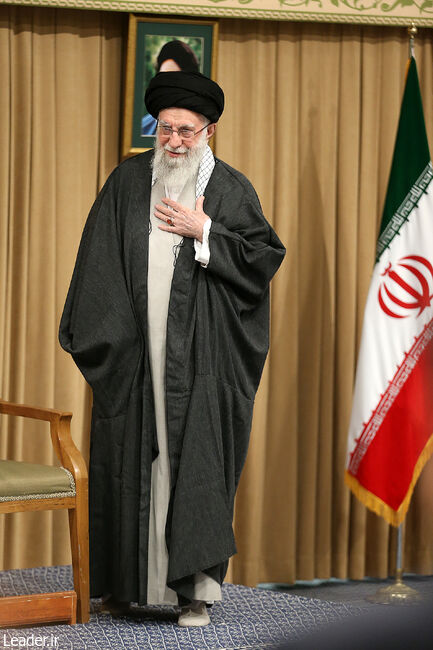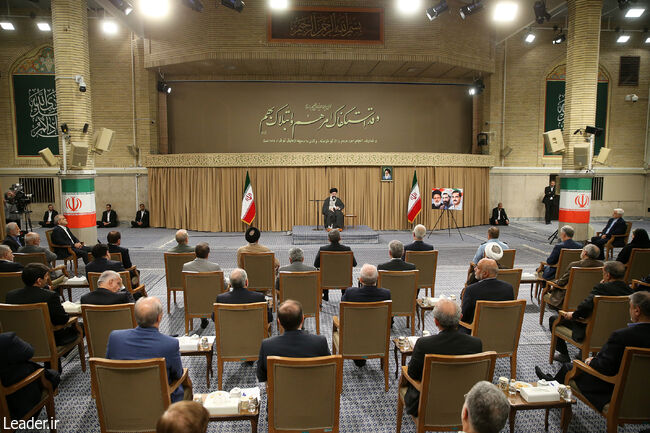In a meeting with the President and the Cabinet this afternoon, the Leader of the Islamic Revolution, while elaborating on the necessity of strengthening the elements of national power and dignity, said that the people’s livelihood is one of the country’s most important issues. He stressed the need for more decisive measures toward “market discipline” and alleviating the people’s concerns about the unrestrained rise in commodity prices. He also offered important recommendations on the necessity of overcoming a "state of neither war nor peace" with an "atmosphere of work, effort, and hope," boosting production, following through on decisions until results are achieved, using the current opportunity for consensus-building to accomplish important tasks, resolving the housing problem, avoiding waste especially in government agencies, and urging officials and media figures to focus on elaborating the country's genuine and hope-inspiring strengths.
He also pointed to the astonishing crimes and atrocities committed by the Zionist regime in Gaza, stating that the way to confront this situation is for protesting countries, especially Islamic countries, to sever their commercial and political ties with this regime.
Ayatollah Khamenei thanked the President, the officials, the managers, and the diligent governmental staff. He gave a special thanks to those governmental agencies that made sacrifices in the truest sense of the word through the 12 Day Trial of War. He praised the President's “motivation,” “morale,” and “hard work,” adding, “Mr. Pezeshkian’s very successful trip to China has opened potential economic and political avenues, which must be pursued in order that their beneficial results can be realised.”
He advised officials who speak with the public, as well as writers and commentators, to apply their power of narration to focus on strength and power, to highlight capabilities and to “avoid narrating about weakness and incapacity." He added, "In addition to officials and commentators, the press and state media also have a responsibility in this regard.”
The Leader of the Revolution described the President's remarks in the meeting as an example of a narration that has “power, hope, and capability,” adding, “Strong motivation, determination, and morale pave the way for the realization of desires and goals.”
Pointing to the necessity of making the use of every fleeting hour an opportunity to serve the people, Ayatollah Khamenei said “If we value the opportunity of service, avoid negligence and duplication, by not becoming distracted with trivial matters, then problems will certainly be solved, not in the long term, but in the medium term.”
He deemed much more serious action should be done in the economic sphere and saw it as essential to take into consideration the people's livelihoods. He said, “In solving problems, we must not wait upon external developments. Of course, everyone with a duty in this regard should fulfil it; but with motivation, determination, hope, and the spirit of work and effort, we must overcome the state of “neither war nor peace” which the enemy seeks to impose, for this situation is harmful and perilous for the country.”
Ayatollah Khamenei stated that the duty of governments is to strengthen the components of national power and national dignity. He said, “The most important of these components is the morale, motivation, unity, and hope of the nation. These factors are those that must, both in word and in deed, be created and reinforced, and prevented from being weakened.”
Paying attention to the correct prioritisation of tasks was another recommendation of the Leader of the Revolution to the cabinet. He said, "Setting priorities is a main tenet of management, and in this matter, attention must be paid to two factors: what can be done immediately and what others require infrastructure."
Ayatollah Khamenei thanked Mr Aref, the First Vice President, for his energy, effort, and for holding sessions to follow up on government decisions. He also said, “Governments are responsible for providing the general and socially shared needs of the people, such as livelihood, security, health, culture, and a comfortable way of life. In these areas, the priorities and outlining the stages of development must be carefully determined.”
The Leader of the Revolution described the realisation of Islamic goals, teachings, and laws as the foundation for the establishment of the system. He said, “The Imam presented these very principles from the very first day, and if anyone says otherwise, it is incorrect.”
He considered the pursuit of decisions until their realisation as a most important task, and said, “The President carries out this follow-up through provincial trips, visiting ministries, and having close contact with the people and managers. But it is necessary that this spirit also be fostered within the administrative body and among mid-level managers so that decisions do not become diluted through the managerial hierarchy, so that, by the time they reach the executive level, nothing of them remains in practice.”
Ayatollah Khamenei expressed satisfaction at the possibility of building consensus in the country. He said, “The harmony, cooperation, and solidarity of the heads of the three branches is admirable, but the decision-making and policy-making bodies must also be active in this process.”
He described the present opportunity for consensus-building in the country, despite diverse viewpoints, as greater than before. He said, “This opportunity must be used for important matters, such as streamlining the government body and reducing the number of agencies whose presence or absence makes little difference.”
The Leader of the Revolution completed his remarks in the meeting with the President and the cabinet by making several recommendations regarding the country’s critical issue of the economy.
His first recommendation focused on focusing attention on production and the revival of production units.
Ayatollah Khamenei said, “All those who understand the issue of the economy in a real and practical manner unanimously agree that production is the key to Iran's economic progress. Therefore, special attention must be paid to production, including not cutting off electricity to these units except in cases of emergency.”
Another recommendation was the timely and complete provision of basic goods. He stated, "The stockpiles of basic goods must be completely reassuring; this action, by eliminating price hikes caused by profiteering, has a direct effect on people's livelihoods and also removes the threat of food insecurity.”
Ayatollah Khamenei criticised monopolies on importing certain basic goods, stating that this practice ties the hands of officials. He said, “Make the import of essential goods and those engaged in it competitive, and they should procure goods from diverse sources. As some experts state, this will reduce the foreign currency cost of purchases as well as their domestic price in rials.”
The Leader of the Revolution once again addressed the vital issue of the people’s livelihood and said, “In matters of livelihood, act in such a way that the people can obtain around ten essential goods without them having anxieties over rising prices so that prices are not doubled today or tomorrow.”
He referred to ration coupons, citing the statements of informed economic experts, as one means of ensuring people’s worry-free access to these ten essential goods.
Another point the Leader emphasised was market discipline. He said, “Manage the market in such a way that the people do not feel it has been left unattended, with prices being one amount today and another tomorrow, or different here from there; for such a perception harms the morale of the people.”
He stressed that it was necessary to pay attention to gas reserves for winter and to plan for compensating for gas shortfalls by means of imports. He also said, “Another recommendation is to focus on the housing issue, for which there are proposals to partially resolve the problem that officials must follow up on until results are achieved.”
Ayatollah Khamenei pointed out factors leading to reduced oil production, such as outdated methods and equipment. He said, “Make use of the knowledge of young graduates to solve problems and transform oil production and extraction. Furthermore, more dynamism is necessary in the field of oil exports, and oil customers must be diversified and multiplied.”
He noted that it was essential to control consumption and refrain from waste and pointed out the significant waste of national resources in the public sector, “There is wastefulness in water, electricity, gas, and government buildings. Likewise, unnecessary travel, large entourages, and stays in expensive hotels are forms of waste that must be prevented and curtailed.”
In the final part of his remarks, the Supreme Leader of the Revolution pointed to the multitude of heinous atrocities committed by the accursed Zionists, which they shamelessly and openly admit to. He said, “Although these crimes are being carried out with the support of a power like America, the path to confronting this situation is not closed. Protesting countries, particularly Islamic nations, must completely sever their commercial and even political relations with the Zionist regime and isolate it.”
He described the Zionist regime as the most isolated and despised regime in the world and added, “A principal line of our diplomacy should also be to encourage governments to sever their trade and political relations with this criminal regime.”
At the beginning of the meeting, the President presented a report on the key programs and activities of the administration over the past year. He cited issues such as the energy imbalance, drought, and certain matters related to external affairs as challenges in the first year of the Fourteenth Administration. He stated, “Given the direct impact of energy on production, we have made significant efforts to resolve the energy problem, which has led to an improvement compared to last year. However, the imbalance has not yet been fully rectified, and we must apologise to the people and producers for the unavoidable cuts in electricity and gas.”
Dr Pezeshkian said that the Ministry of Energy’s program to reduce electricity consumption this year was effective. He also said, “Regarding water, given the forecast of continued drought, expert teams made up of leading scholars have been formed to tackle the problem.”
The President referred to the administration's plan to install 7,000 megawatts of solar power by the end of the year. He said, “In the field of fuel reserves, this year reserves have increased to more than 3 billion cubic metres, so that in winter we will face fewer problems compared to last year.”
Mr Pezeshkian said that the strengthening of national cohesion is an important agenda of the government, adding, “If we are all united, no power will be able to bring Iranians to their knees. Just as during the recent imposed war, the people's solidarity led to the enemy's despair, so too, by gaining public participation, we can overcome all problems.”
The President declared that economic growth and curbing inflation were another priority of the administration. He said, “The expansion of the government and its increasing expenditures are among the main factors of inflation. We intend, with the cooperation of the Parliament and other institutions, to reform the administrative structure, downsize and streamline the government, and pursue performance-based budgeting through structural reform. Of course, another cause of inflation is the problems of the banking system, for which the Central Bank is responsible for supervision and control.”
Mr Pezeshkian mentioned "expanding educational justice" as another agenda of the administration. Pointing to the inauguration of 2,400 new schools in the new academic year, he said, “We are pursuing a grand school construction movement based on a neighbourhood-centred model with public participation.”
The President regarded the allocation of ration coupons to seven income deciles of society as one of the government’s measures for “increasing social welfare and reducing people's living costs” and said, “We are determined to provide the people with ration coupons every month.”
Mr Pezeshkian stated that pursuing the "Family Physician and Referral System" plan is one of the administration's priorities in the healthcare sector. Paying tribute to the commendable role and services of healthcare personnel during the recent imposed war, he described the administration's foreign policy agenda as focused on developing international relations. He said: The country's relations with all neighbours in various fields are better than before, and by strengthening these relations and cooperation, the perception of Europe and America that they can stop us through sanctions will come to nothing.”
Pointing to the important understandings and agreements of the Islamic Republic with countries such as Russia, China, Iraq, Turkey, and the Eurasian states, Dr. Pezeshkian added, “The parties are determined to implement what has been put on paper.”
The President stated that the government attaches importance to the development of vital infrastructure by completing key corridors, ports, and highways. Citing the completion of the Zahedan-Chabahar railway by the end of the year, he said, “One of the bright spots of the recent war was the high volume of activity by truckers transporting goods from the ports.”
Mr Pezeshkian pointed out that the government’s plan in the oil and gas sector is to increase daily oil production by 250,000 barrels during the current year. Referring to the collection of over 10 million cubic meters of flare gas this year, he added, “The value of this volume of gas equals $700 million, and the government’s plan is to return all flare gas into the cycle within one to two years.”
The President said, “The government promises to spare no effort in addressing shortcomings. We believe that with trust in God, the guidance of the Leader of the Revolution, the participation and solidarity of the people, and the exceptional unity and coordination that exists today among the three branches of government, as well as the armed forces, problems can be resolved and we will overcome them all.”



